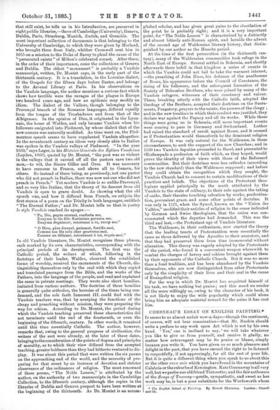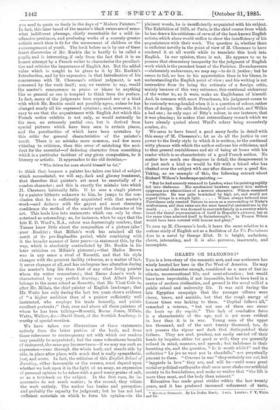CHESNEA.U'S ESSAY ON ENGLISH PAINTING.* IT seems to us almost
unfair now-a-days—though the sentiment, of course, will not bear examination—that Mr. Ruskin should write a preface to any work upon Art which is not by his own hand. Yes,' one is inclined to say, we will take whatever you liye to give us from yourself, and receive it gladly, no matter how extravagant may be its praise or blame, simply because you write it. You have given us so much pleasure and delight in the past, that you have earned the right to be listened to respectfully, if not approvingly, for all the rest of your life. But it is quite a different thing when you speak to us about this or the other rara avis which you have found in the mountains of Calabria or the suburbs of Kensington. Kate Greenaway is all very well, but we prefer our old friend Tintoretto ; and the fair authoress of the Songs of Tuscany—gentle, sympathetic, and sweet as her work may be, is but a poor substitute for the Wordsworth whom • The English School of Painting. By Ernest Chesnean. London: Cassell and Co.
you used to quote so freely in the days of "Modern Painters." ' In fact, this later brood of the master's black swans are of some- what indifferent plumage, chiefly remarkable for a mild in- offensive prettiness, and producing works of a scarcely-greater artistic merit than is fit for the amusement of children or the encouragement of youth. The book before us is by one of these latest discoveries of Mr. Raskin (he is hardly to be called a pupil), and is interesting, if only - from the fact that it is an honest attempt by a French writer to characterise the peculiari- ties and criticise the importance of English Art. But the added value which is sought to be given to it by Mr. Ruskin's Introdaction, and by his expression in that Introduction of his concurrence with M. Chesneau's critical judgment, is not possessed by the work itself; nor,- we venture to say, would the master's concurrence in praise or blame be anything like so -general as one is tempted to think from the preface. In fact, many of the judgments here expressed are of a kind with which Mr. Ruskin could not possibly agree, unless-he has changed nearly all his- expressed opinions ;, and, moreover, it is easy to see that the acquaintance with English Art -which this
• French -writer exhibits is not only, as -would naturally be the ease, an extremely partial one, but is derived from special pictures which have been seen in certain places, and the peculiarities of which have been mistaken -by this critic for -general characteristics of the painter's merit. There is no mistake more common, and few more vitiating to criticism, than this error- of mistaking the acci- dent for -the essential—of -deducing character from something -which is a particular incident of any-given ;composition, be it literary or artistic. It approaches to the old -doctrine,—
niirbo drives fat oxen should himself be fat;"
to .t'aink that: because a painter has taken one kind of subject • which necessitated, we will Lay, dark and .gloomy treatment, that therefore that painter's art must be essentially of a sombre character ; and this is exactly the mistake into which M. Chesneau habitually. falls. If he sees a single piotre by apaMter hitherto unknown to him, he jumps to the con- clusion that he is sufficiently acquainted with that master's rwork—and deduces with the gayest and most charming confidence the method of the master and the character of hie • art. This leads him into statements which can only be char- - acterised as astounding; as, for instance, when he says that the late E. D. Ward's, R.A., colour was depressingly sombre; that .Turner knew little about the composition of a picture.(alas !
• poor Ruskin) ; that Millais's work has retained all the _merit of its pre-Raphaelite period, while combining with it the broader manner of later years—(a statement this, by the way, which is absolutely contradicted by Mr. Ruskin in his later criticism on Millais's pictures);—that Madox Brown was in any sense a rival of Rossetti, and that his style changes with the greatest facility (whereas, as a matter of fact, it never changes at all, and has undergone less alteration during the master's long life than that of any other living painter whom the writer remembers) ; that Burne Jones's work is characterised by very perfect drawing ; that Albert Moore belongs to the same school as Rossetti; that Mr. Vicat Cole is, after Mr. Millais, the chief painter of English landscape ; that Mr. Watts has only during the last ten years shown evidence of "a higher ambition than of a painter sufficiently well instructed, who employs his trade honestly, and paints excellent portraits ;" that, over and above all these painters of whom he has been talking—Rossetti, Burne Jones, Millais, Watts, Walker, &c.—David Scott, of the Scottish Academy, is worthy of speoial mention.
We have -taken our illustrations of these statements entirely from the latter portion of the book, and -from those references to contemporary art with which our readers may possibly be acquainted ; but the same voluminous breadth of statement, the same gay incorrectness—if we may use such an expression—runs through the whole book, and stands side by side, in place after place, 'with much that is really- sympathetic, just, and acute. In fact, the criticism of this _English School of Painting, either favourable or the reverse, must depend upon whether we look upon it in the light of an essay, an expression of personal opinion to be taken-with a good many grains of salt, or as a text-book on the subject. In the first ease, its in- accuracies do not much matter ; in the second, they vitiate the work entirely. The author has brains and perception, and probably the capacity for judgment ; but he has not had sufficient materials on which to form his opinion—in the
plainest words, he is insufficiently acquainted with his subject. The Exhibition of 1878, at Paris, is the chief source from which he has drawn his criticisms of several of the best-known English artists;which alone would suffice to show the inenfficiency of his acquaintance-with their work. The question is, whether there is sufficient novelty in the point of view of M. Chesnean to have
rendered it at all 'worth while to translate this book -into English. In our opinion, there is not. He appears to us to possess that elementary incapacity for the judgment of English work which is the proudest boast of the Parisian. Heendeavoure —elaborately endeavours;-we may say—to do-it justice ;but- he seems to fail, no less in -his appreciation than-in his blame, in understanding-the English point of view ; and his-writing is not instructive from its being the estimate of a foreign critic, -mainly because of this -very reticence, this-continual endeavour . of the writer to, as it were; make an Englishman of himself.
And, in common with most Frenchmen; -his judgment-seems to be curiously wrong-headed- when it is a question of colour, rather
than of design. He calls Mulready a good colonrist, and Wilkie a bad one;- he only says of Etty's colour, in one instance,-that it-was pleasing; he makes that extraordinary remark-which-we have already quoted about Ward's colour being excessively sombre, &c.
-We-seem to--have found a good many-faults in -detail-with this essay of 11. Chesnean's ; let us do all the justice in our power to the lively-style in which it is-written,-to the continual witty phrases with which the author enlivens his criticisms; and to-that general readableness and air of -being at- home with his
reader--which is so characteristic of a good French author. ' No matter how much one disagrees in detail; the disagreement is of just such a kind- as -would be felt-with a, friend who- has chatted over the•subject with one -after dinner-over a -good- fire. Taking, as -an -example of -this, the following extract-about Richard Wilson's-landscape-painting :— "But-he had scarcely retut ned to London, when his paintingrutiidly -fell 'into'-disfavour. His- aeadetnical .brothers spared him- neither epigrams nor admonitions of a- severer -character. Wilson,seinained incorrigible. He was quite bewitched -by high art, and would not regard things in a simple light Wilson always believed that Providence only-created Nature to serve as a surrounding td 'globe's misfortunes, and -that ruins are the most beautiful architecture in the world He was doomed to succumb-fatally-in a eountrywhich loved the literal representation of itself in Hogarth's pictures, but at the same time admired itself in Gainsborough's. In France Wilson would have been covered with honour and glory."
To sum up M. Chesnean's book, it bears the same relation to a serious study of English ease a feuilletou- of La Vie Parisienne does to a novel by George Eliot. It is bright, audacious, clever, interesting, and it is also -perverse, inaccurate, and incomplete.







































 Previous page
Previous page